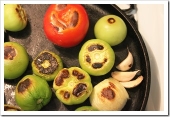
 17
17




No rain, no rainbow.
 7
7




Ryan Hobbs wrote:4. Learn to manage temperature.
Ingredients that are different require different temps. You want to sweat the onions, but sear the beef, not the other way around.
"The rule of no realm is mine. But all worthy things that are in peril as the world now stands, these are my care. And for my part, I shall not wholly fail in my task if anything that passes through this night can still grow fairer or bear fruit and flower again in days to come. For I too am a steward. Did you not know?" Gandolf
 4
4




 6
6




'Every time I learn something new, it pushes some old stuff out of my brain.'
 2
2




 8
8




Living a life that requires no vacation.
 2
2




 3
3




 6
6




"The rule of no realm is mine. But all worthy things that are in peril as the world now stands, these are my care. And for my part, I shall not wholly fail in my task if anything that passes through this night can still grow fairer or bear fruit and flower again in days to come. For I too am a steward. Did you not know?" Gandolf
 7
7




 4
4




 4
4




 7
7




 3
3






 3
3




Dale Hodgins wrote:They don't need more junk. But almost all of them need a bunch of things sharpened.
I remember my mom used to watch The Galloping Gourmet. He would slice a tomato and she would mush one, and then blame it on the tomato.
 4
4




 2
2




"Them that don't know him won't like him and them that do sometimes won't know how to take him... he ain't wrong, he's just different and his pride won't let him do the things that make you think he's right"
 3
3




 5
5




Ryan Hobbs wrote:He asked me for 5 pieces of advice for him to follow that would make him a good cook.
"Where will you drive your own picket stake? Where will you choose to make your stand? Give me a threshold, a specific point at which you will finally stop running, at which you will finally fight back." (Derrick Jensen)
 2
2




Devin Lavign wrote:
Ryan Hobbs wrote:He asked me for 5 pieces of advice for him to follow that would make him a good cook.
I didn't see it mentioned so will add this critical piece of advice. Learn to read a recipe! As simple as that sounds, it is the most important thing I feel. To know what a recipe says and means is important, as well as if you can read one you are able to try what others said worked for them. Plus the is a lot of skills you learn to read a recipe like whip, blend, fold, etc will go a long ways as these are the basic skills needed to cook.
Dale Hodgins wrote:My primary knife skill is that I keep knives razor sharp. Often, when I help someone cook at their house, I'm handed a butcher knife that behaves more like a butter knife since it has never been properly sharpened.
I take my cordless grinder along, when I visit people who are going to have dull knives. That will be my Christmas gift for many people again this year. They don't need more junk. But almost all of them need a bunch of things sharpened.
I remember my mom used to watch The Galloping Gourmet. He would slice a tomato and she would mush one, and then blame it on the tomato.
No rain, no rainbow.
 6
6




Ryan Hobbs wrote:
2. Learn Japanese knife skills.
I use 2 knives in my kitchen: a boning knife and a nakiribocho. The nakiribocho is the perfect knife for all things vegetal. Learn to use it and you can make anything.
 4
4




Growing on my small acre in SW USA; Fruit/Nut trees w/ annuals, Chickens, lamb, pigs; rabbits and in-laws onto property soon.
Long term goal - chairmaker, luthier, and stay-at-home farm dad. Check out my music! https://www.youtube.com/@Dustyandtheroadrunners
 1
1




 3
3




F Agricola wrote:There's a good historical reason why The Silk Road existed - spice and herb trade from Asia to Europe.
So, my advice is to get to know all the myriad spice and herb combinations and how roasting/grinding them imparts a completely different palette of flavours.
Come join me at www.peacockorchard.com
 4
4




Ryan Hobbs wrote:
Devin Lavign wrote:
Ryan Hobbs wrote:He asked me for 5 pieces of advice for him to follow that would make him a good cook.
I didn't see it mentioned so will add this critical piece of advice. Learn to read a recipe! As simple as that sounds, it is the most important thing I feel. To know what a recipe says and means is important, as well as if you can read one you are able to try what others said worked for them. Plus the is a lot of skills you learn to read a recipe like whip, blend, fold, etc will go a long ways as these are the basic skills needed to cook.
My favorite recipe for fried chicken is vague as heck in its original version, but it is still workable if you know mid 18th century cooking terminology. I had to sub cider vinegar for verjus (juice from unripe grapes), but it turned out fantastic anyways. So I agree that being able to read and understand the recipe is vital.
"Where will you drive your own picket stake? Where will you choose to make your stand? Give me a threshold, a specific point at which you will finally stop running, at which you will finally fight back." (Derrick Jensen)
 2
2




∞




 4
4





| I agree. Here's the link: http://stoves2.com |


